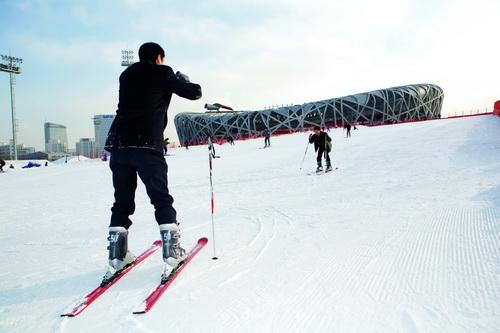 Jul. 15, 2025
Jul. 15, 2025
Weather
Why Beijing Olympic venues have become wealth rather than burden
2010-03-12 17:14 BJT
The public has been concerned about this problem: Have the Olympic venues such as the Bird’s Nest, the National Aquatics Centre (or the Water Cube) and Wukesong Basketball Stadium become a wealth source or a burden in the post-Olympic period?
In less than two years since the 2008 Beijing Olympics was over, a series of successful post-Olympic operations based on the sports industry and art performances have been conducted in these venues, and one after another innovative and popular projects have garnered both social and economic benefits. These venues have gradually become the standard for China’s cultural and sports industries.
 |
| The Bird's Nest became Beijing's biggest ski park from Dec. 19, 2009 to Feb. 20. |
After the Olympic Games are over, all host cities are faced with the difficult problem of how to make use of and maintain the Olympic venues. The massive costs to build and maintain Olympic venues have much troubled Montreal, Sydney, Athens and other Olympic host cities, and it took Montreal dozens of years to repay the huge debts resulting from hosting the Games.
Chinese people were encouraged by the successful Beijing 2008 Olympic Games and Paralympic Games. All attention is given to the Bird’s Nest and other main Olympic venues that were built at a cost of tens of billions of yuan: what kind of fate they will face and what kind of life will they lead after the Games are over?
To our happiness, during the less than two years after the Beijing 2008 Olympic Games were over, the Italian Super Cup, Happy Snow Season, the opera Turandot, which was directed by Zhang Yimou, and other activities were successfully held at the Bird’s Nest, and over 100 art performances, called the Magic Water Cube, were staged at the Water Cube. Additionally, the National Tennis Center will hold the China Tennis Open, which has been classified as one of the WTA’s top events. These brilliant sports and cultural activities have not only energized these Olympic venues and satisfied the public’s need for cultural and sporting events, but also enabled these Olympic venues to make their first successful step towards post-Olympic operation. This is a successful step towards realizing social and economic benefits that these venues can bring.
 Mail
Mail Share
Share Print
Print


 Video
Video









 2009 China Central Television. All Rights Reserved
2009 China Central Television. All Rights Reserved